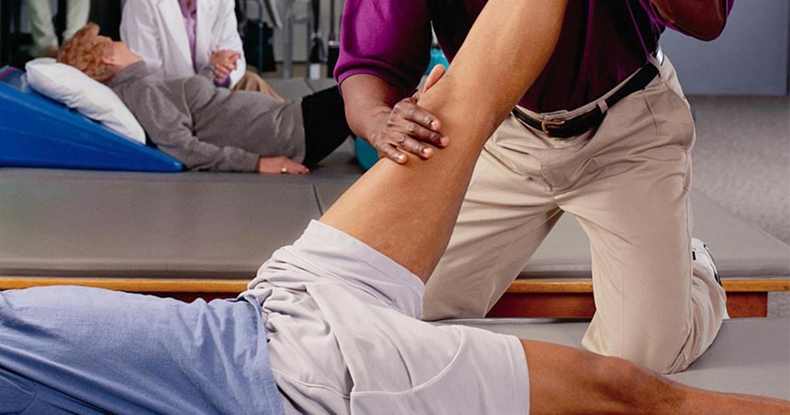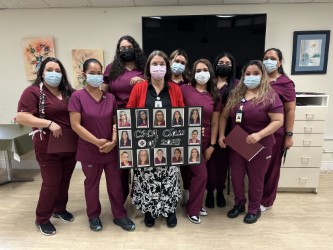Routine Vaccinations Important, Even During COVID-19
- Category: Health & Wellness, Infection Prevention
- Posted On:
- Written By: LVMC

Just a few months ago, the Centers for Disease Control reported that the number of routine childhood vaccinations was dropping because parents were not returning to their doctors for well-child visits due to fears of contracting COVID-19.
Lompoc Health pediatricians – myself, Dr. Abhishek Mehta, and Dr. Mohammad Tabek Bakir – follow the recommendation of the American Academy of Pediatrics that it is important to continue to receive routine vaccinations during the virus pandemic.
The most important precaution is to prevent sick patients from mixing with healthy children, so you must practice safe distancing and mask use. Let us reassure you that at Lompoc Health we are practicing what we preach. All people entering the buildings – including our employees – must answer a series of health screening questions and have contact-less temperatures taken. Masks are also required at all times by everyone in the buildings. Our employees make sure that surfaces are clean and hand sanitizer is available.
If you still have concerns, here are some pros and cons.
- Think ‘Why COVID is so deadly?’ That is because there is no vaccination for it. Doesn’t it make sense, then, to vaccinate against the other deadly diseases such as meningitis and polio when those vaccines are so readily available?
- Would you close the front door of the house and let the back door open for the burglar? Don’t slam the front door of your child’s health against COVID-19 and leave the back door wide open to other diseases like measles and whooping cough.
Some parents may think they can just “catch up” with vaccinations next year after the severity of COVID-19 has passed. This is not the case. If your child does not have the scheduled vaccination, the child is unprotected from potential disease and can get seriously ill when they intermingle with other children after the stay at home orders are lifted.
Vaccines are manufactured by various methods, but they all have one thing in common: they create or boost your child’s immunity to a particular germ without producing a serious infection. The risk of side effects from a particular disease, such as measles, is far worse than the risk of the vaccine. Beware of internet sites that blame autism and other such conditions on vaccinations; their data is bogus. As a physician who has practiced for nearly 50 years and lived through the dark ages before vaccination, I have seen too many preventable deaths and disability from meningitis, epiglottis, and other infections. I believe people on the anti-vaccination bandwagon have no idea of how terribly sick the world would be without immunizations.
Please don’t wait to vaccinate your child because of COVID-19. Children should be vaccinated against Chickenpox; Diphtheria, Tetanus and Pertussis (DTaP); flu; measles, mumps, and rubella (MMR).
Here are recommended immunizations:
Typically, by the age of 2, children have:
- One vaccination for measles, mumps, and rubella (MMR)
- Four vaccinations for Haemophilus influenza(Hib), an upper respiratory infection that can cause meningitis
- Three polio vaccinations (IPV)
- Four vaccinations for diphtheria, tetanus, and pertussis (DPT)
- Three vaccinations for hepatitis B
- Three vaccinations for rotavirus, a type of infection that causes severe diarrhea
- Four vaccinations for pneumococcal disease, a common cause of ear infections and pneumonia
- One vaccination for varicella (chickenpox) no earlier than age 12 months.
From age 4 to 6, your child will need booster shots for DPT, IPV, MMR, and chickenpox. Children after the age of 6 months should have an annual flu shot. Pre-teens receive the following vaccines:
- Human Papillomavirus (HPV)-- HPV vaccine is safe, effective, and can protect against infection with the types of HPV that can cause certain cancers.
- Pertussis-- Whooping cough (pertussis) can cause severe coughing spells. Preteens suffering from whooping cough can be hospitalized and miss weeks of school.
- Meningococcal-- Bacterial meningitis is a very serious infection that can cause brain damage, arm and leg amputations, kidney damage, and death. That’s why it’s crucial for all preteens to get one shot of quadrivalent meningococcal conjugate vaccine at 11 or 12 years of age and a booster at age 16.
- Influenza--Influenza is widespread in California. Everyone 6 months of age and older need to be immunized against influenza each year.
Be sure to check with your pediatrician to see what vaccines your child may need for sure and feel free to ask any questions you may have. And please, don’t let COVID-19 stop you from getting your child immunized.






